Susan Bernofsky's Blog, page 42
May 19, 2015
Apply Now to Become a 2015 ALTA Fellow
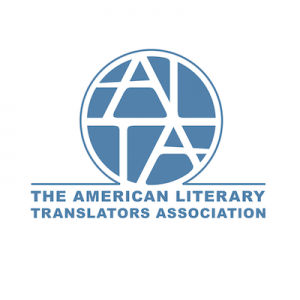 If you’re an emerging translator, attending the American Literary Translators Association conference is one of the best things you can do to jump-start your career, especially if you land one of the coveted $1000 fellowships given out every year to help newcomers to the field attend. Everything I wrote about this last year still applies; and you can read here what last year’s fellows had to say about the experience, and last year’s program is still online. I even blogged the conference last year – here’s my report. This year’s conference will be held in Tucson, AZ, October 28 – 31, 2015, and will feature keynote addresses by Jerome Rothenberg and Stephen Snyder. If you’re new to this business, please take my word for it: attending the conference is a great way to meet other emerging translators as well as more experienced ones who can help you find your way in this field. The deadline to apply to become a 2015 ALTA Fellow is coming right up: June 1, 2015, so check out the guidelines and get your application in!
If you’re an emerging translator, attending the American Literary Translators Association conference is one of the best things you can do to jump-start your career, especially if you land one of the coveted $1000 fellowships given out every year to help newcomers to the field attend. Everything I wrote about this last year still applies; and you can read here what last year’s fellows had to say about the experience, and last year’s program is still online. I even blogged the conference last year – here’s my report. This year’s conference will be held in Tucson, AZ, October 28 – 31, 2015, and will feature keynote addresses by Jerome Rothenberg and Stephen Snyder. If you’re new to this business, please take my word for it: attending the conference is a great way to meet other emerging translators as well as more experienced ones who can help you find your way in this field. The deadline to apply to become a 2015 ALTA Fellow is coming right up: June 1, 2015, so check out the guidelines and get your application in!
The post Apply Now to Become a 2015 ALTA Fellow appeared first on TRANSLATIONiSTA.
May 13, 2015
2015 PEN Translation Prizes Announced
If you’ve been on tenterhooks ever since the shortlists for the PEN Translation Prize and the PEN Award for Poetry in Translation were made public last month, you’re in luck: this year’s winners have just been announced.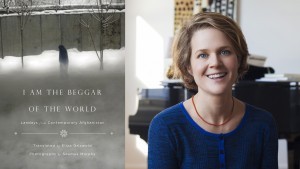
The 2015 PEN Award for Poetry in Translation has gone to Eliza Griswold for I Am the Beggar of the World, a collection of work by Afghan women writers translated from the Pashto (Farrar, Straus and Giroux). More information about the book and the award (including the j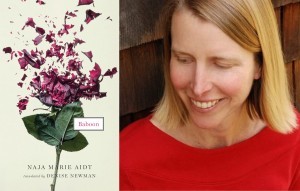 udge’s statement) here.
udge’s statement) here.
The 2015 PEN Translation Prize goes to Denise Newman for Baboon, translated from the Danish (Two Lines Press). More information about the book and the award (including the judges’ statement) here.
Each prize comes with a $3000 purse; both will be presented at a ceremony at the New School on June 8.
The winners of all the 2015 PEN literary prizes (even the non-translation ones) can be found here. Congratulations to this year’s winners!
The post 2015 PEN Translation Prizes Announced appeared first on TRANSLATIONiSTA.
May 12, 2015
Translation on Tap in NYC, May 16 – 31, 2015
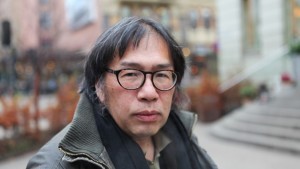
Xi Chuan
Finally spring has arrived, a summery spring at that: perfect weather for translation events! BEA will be taking place from May 27-29, and I’ve listed a large number of translation events associated with the expo here. And then there’s this:
Friday, May 15:
A Poetry Reading and Conversation with translator/poets Xi Chuan and Eliot Weinberger, introduced by Jeffrey Yang. More info here. UWS Barnes and Noble, 82nd & Broadway, 7:00 p.m.
Saturday, May 16:
Poet in the Scholar’s Garden: A Reading with Xi Chuan. Introduction by Eliot Weinberger. More info here. Note that this one is listed as a members’-only event, for members of The New York Chinese Scholar Garden, 1000 Richmond Terrace, Staten Island, 4:00 – 5:30 p.m.
Tuesday, May 19:
CLMP, the Community of Literary Magazines and Presses, is hosting where they’re calling a “Publisher — Translator Networking Soirée,” to be held in the CLMP offices. The website specifically invites members of ALTA, CLMP and the New York Circle of Translators to attend, but I’m told all literary translators are welcome as long as they RSVP in advance. Tickets are $5, wine will be served. More information here. 154 Christopher St., Suite 3C, 6:00 – 7:30 p.m.
Also Tuesday, May 19:

C.K. Scott Moncrieff
In Search of C.K. Scott Moncrieff: The Man Who Brought Proust to the English-speaking World. Launch event for Jean Findlay’s new biography, Chasing Lost Time: The Life of C.K. Scott Moncrieff: Soldier, Spy and Translator, featuring Findlay in conversation with Eric Banks. More information here. CUNY Graduate Center, Martin E. Segal Theatre, 365 Fifth Ave., 6:00 – 8:00 p.m.
Thursday, May 21:
Chasing Lost Time: Celebrating Scott Moncrieff and Michael Henry Heim, with translator Esther Allen (co-editor of The Man Between) and Moncrieff’s biographer (and great-great-niece) Jean Findlay. More information here. Albertine, 972 Park Ave., 7:00 – 9:00 p.m.
Also Thursday, May 21:
Silvina Ocampo Celebration, featuring author/translators Jason Weiss, Suzanne Jill Levine, Sylvia Molloy discussing Ocampo’s work to mark the publication of a collection of her poems translated by Weiss and Thus Were Their Faces (transl. Daniel Balderston). Ticketed event, more information here. Americas Society,680 Park Ave., 7:00 p.m.
Wednesday, May 27 – Friday, May 29
Book Expo America with many translation events scheduled at the Javits Center and in different locations around town. There are so many events I’ve blogged them separately: voila.
Friday, May 29:
Read Russia Prize ceremony, more info here. Grolier Club, 47 E. 60th St., time TBA.
Saturday, May 30:
A Chinese and American Poetry Reading, with Lan Lan, Zhao Lihong, Edwin Frank, Peter Gizzi, and translator Canaan Morse, moderated by Eleanor Goodman, more info here. Bowery Poetry Club, 308 Bowery, 1:00 p.m.
The post Translation on Tap in NYC, May 16 – 31, 2015 appeared first on TRANSLATIONiSTA.
Translation at BEA 2015
 It’s about time for Book Expo America (May 27-29), the big New York-based trade fair for the book industry, and this year’s programming includes a large number of translation events. The featured country this year is China, so look for a lot of events featuring Chinese publishers, editors, and authors. I’ve included the most translation-centric of these in my listing below, and you can find more here (China-related events) and here (all others). BEA is held at the Javits Center and is open only to registered visitors (registration info here); some of these events, though, will be held off-site and are open to everyone without registration (see the notation off-site in the listings below). The PEN Translation Committee has put together three sessions on issues of particular interest to translators and those who publish them (see the notation PEN below).
It’s about time for Book Expo America (May 27-29), the big New York-based trade fair for the book industry, and this year’s programming includes a large number of translation events. The featured country this year is China, so look for a lot of events featuring Chinese publishers, editors, and authors. I’ve included the most translation-centric of these in my listing below, and you can find more here (China-related events) and here (all others). BEA is held at the Javits Center and is open only to registered visitors (registration info here); some of these events, though, will be held off-site and are open to everyone without registration (see the notation off-site in the listings below). The PEN Translation Committee has put together three sessions on issues of particular interest to translators and those who publish them (see the notation PEN below).
Wednesday, May 27:
Best Translated Book Awards, awards ceremony hosted by Chad Post, more info here. Eastside Stage, 2:30 – 2:55 p.m. Party to follow off-site at The Folly, 92 W. Houston St., 5:00 – 7:00 p.m.
Retranslating the Great Works of Literature: How and Why? (PEN), with Burton Pike, Sandra Smith and Robert Weil, more info here. Eastside Stage, 4:00 – 4:25 p.m.
Thursday, May 28:
Reaching the Reader: Publicizing International Literature (PEN), with Allison Markin Powell and Juliet Grames, more info here. Eastside Stage, 10:00 – 10:25 a.m.
BEA Selects Translations – Adult Fiction, with Chad Post, more info here. Eastside Stage, 10:00 – 10:25 a.m. (Yes, both this event and the one listed before it seem to be scheduled for the same time and place. I’ve alerted BEA and will update this post when they’ve fixed it.)
The Archipelago Norman Manea, with Bogdan-Alexandru Stănescu joining Manea. Not technically a translation event, but if you’re reading this, I thought you might also be interested in attending a classy foreign-literature event while you’re at BEA. More info here. Eastside Stage, 11:30 – 11:55 a.m.
Literary Translation Between China and the US: Status Quo and Perspectives, with Eric Abrahamsen, Karen Christensen, Bi Feiyu, Liu Guohui, Li Jianchen, and Liu Zhenyun, more info here. Room 1E11, 2:00 – 2:55 p.m.
Death of a Happy Man: Conversation with Giorgio Fontana, with Mark Rotella joining Fontana. This one, too, is a literary rather than a translation event. More info here. Eastside Stage, 2:30 – 2:55 p.m.
Friday, May 29:
Baiting the Hook: How to Catch an Editor’s Interest (PEN), with Corinna Barsan and Ezra Fitz, more info here. Eastside Stage, 10:00 – 10:25 a.m.
BEA Selects Translations – Crime/Thriller, with Tom Roberge, more info here. Eastside Stage, 10:30 – 10:55 a.m.
Running Through Beijing + Beijing Beijing, with Feng Tang and Xu Zechen in conversation with Canaan Morse, more info here. Off-site, at the UWS Barnes and Noble, Broadway at 82nd St., 7:00 pm.
Saturday, May 30:
A Chinese and American Poetry Reading, with Lan Lan, Zhao Lihong, Edwin Frank, Peter Gizzi, and Canaan Morse, moderated by Eleanor Goodman, more info here. Off-site, at the Bowery Poetry Club, 308 Bowery, 1:00 p.m.
Given that the guest country for this year’s Expo is China, the BEA schedule also contains a number of “signing ceremonies” marking the collaboration of Chinese and U.S. publishing houses. If you’d like to attend some of these, see the general Global Market Forum: China listings here. You’ll also find a long listing of off-site literary events connected with the expo here.
The post Translation at BEA 2015 appeared first on TRANSLATIONiSTA.
May 11, 2015
Talking Translation at the 2015 PEN World Voices Festival: Bloggers and the Slam
This was such a productive PEN World Voices Festival in terms of translation that I wound up blog-exhausting myself yesterday on just the one panel, but there were two more events I attended that I’d like to share some information about. The first was the bloggers’ panel directly following the Women’s Voices in Translation one – both were organized by the PEN Translation Committee and held on Saturday 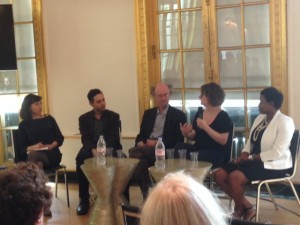 in the gorgeous ballroom/event space across the hall from Albertine, the prettiest little bookstore you’ll ever see, featuring only French-language literature – both in French and in English translation – tucked away in a Fifth Ave. mansion designed by Stanford White that now houses the cultural services division of the French consulate. The bloggers assembled here were all translated-book bloggers focusing largely on reviews (Three Percent’s Chad Post and I watched from the sidelines). Most of them have been at it longer than I have (2010):
in the gorgeous ballroom/event space across the hall from Albertine, the prettiest little bookstore you’ll ever see, featuring only French-language literature – both in French and in English translation – tucked away in a Fifth Ave. mansion designed by Stanford White that now houses the cultural services division of the French consulate. The bloggers assembled here were all translated-book bloggers focusing largely on reviews (Three Percent’s Chad Post and I watched from the sidelines). Most of them have been at it longer than I have (2010):
Tara Cheesman-Olmsted of BookSexyReview (since 2009)
Scott Esposito of Conversational Reading (since 2004)
Nana-Ama Kyerematen of Afridiaspora (2013)
Michael Orthofer of The Complete Review (1999[!])
Moderator Sal Robinson proposed the thesis that for the reception of translated literature bloggers have been more important in recent years than conventional print publications. It’s definitely an interesting claim, and goes along with what I always say about the proliferation of small publishers specializing in translation: without the Internet in general and social media in particular they’d have trouble getting the word out about the authors they publish. In general, I think Sal is right: the blockbuster works in translation (think, this year, Knausgaard and Ferrante) get plenty of attention in the usual book review organs, but books by less famous authors published by smaller presses can easily get overlooked by, say, the NYTBR (especially if they’re written by women, as it turns out).
So we heard lots of good stories about the genesis and development of these blogs. Tara Cheesman-Olmsted started out writing about books in general, then decided in 2011 to make the works in translation – which she found were being neglected elsewhere – the sole focus of her blog. Scott Esposito was attuned to literature in translation early on thanks to his long-time association with the Center for the Art of Translation in San Francisco. Michael Orthofer started using The Complete Review just as a place to aggregate what was being written about the books elsewhere, then started adding his own reviews as well (he still aggregates, which is extremely useful). (By the way, readers of German might be interested in Perlentaucher, an excellent aggregator of book reviews [in German] that’s been around since 2007. I wonder if they got the idea from Orthofer’s site.) He too, started out reviewing mostly books written in English and then gravitated towards works in translation.
The “youngest” of these blogs, Afridiaspora, got started because Nana-Ama Kyerematen found that many of the books by African writers she was finding and loving weren’t getting the attention they merited in other outlets. Her blog isn’t actually translation-oriented (most of the writers she features write in English), but it certainly brings attention to African writers you might not otherwise hear about; she also manages to put on an impressive number of events in connection with the blog, including a one-day mini-festival at the Brooklyn Public Library in 2013.
Internet-specific topics that came up in the course of the discussion: the rise of “shadow juries” around some of the major prizes (when book bloggers band together to pick their own favorites for, e.g. the Man Booker Prize); coordinated efforts among bloggers, such as when a few key players decide to spend the month talking about books from a certain region or language, e.g. declaring it Spanish Literature month. There’s even a #WomenInTranslation Month (started by Meytal Radzinski /@Biblibio on her own blog).
Do book bloggers who review books in translation also review (or even discuss) the translation? A quick peek at Esposito’s and Cheesman-Olmstead’s blogs reveal that they often do comment on the translation at least briefly as part of their reviews (Thank you!). Orthofer said he often doesn’t though he knows he probably should; he does, though, sometimes review books in multiple translations, with the translations themselves then forming a central focus of the review. I’m always glad to see bloggers and book reviewers talking about translation even if they aren’t translators themselves – I mean, no one worries about reviewers writing about novels without being novelists!
The panel ended with a lightning round of book recommendations:
Robinson: Leg over Leg by Ahmad Faris al-Shidyaq, translated by Humphrey Davies
Orthofer: Sphinx by Anne Garréta, translated by Emma Ramadan
Esposito: Thus Were Their Faces by Silvina Ocampo, translated by Daniel Balderston
Cheesman-Olmstead:
The Meursault Investigation by Kamel Daoud, translated by John Cullen
Down the Rabbit Hole and Quesadillas by Pablo Villalobos, translated by Rosalind Harvey
Letter to Jimmy by Alain Mabanckou, translated from the French by Sara Meli Ansari (but she recommends you start with a novel by Mabanckou first and read this one second)
Pretty much anything by César Aira
Kyerematen:
The Fishermen by Chigozie Obioma
by NoViolet Bulawayo (“best novel I’ve read in five years”)
Orthofer also mentioned he’s been enjoying books in the Modern Library of Indonesia series. Cheesman also made me happy by mentioning that she’s started to follow the work of translators whose work she especially enjoys and will read whatever they translate (the faves she listed include Jordan Stump, Chris Andrews, and Heather Cleary).
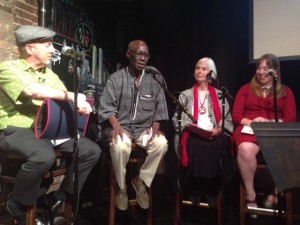 The last PEN World Voices Festival event I want to write about was the Translation Slam, a perennial favorite, held this year for the first time in the Nuyorican Poets Cafe, which proved to be a perfect venue for the slam, with the same gritty charm (unfinished brick walls) we knew and loved from the pre-renovation Bowery Poetry Club, and an excellent big screen up front for displaying work. Readers of this blog should already know what the slam is about. In case you don’t: the short version is that two competing translations are commissioned of a short text; writer and translators read; and then all the versions are put on the screen for the writers/translators/audience members to discuss. Michael Moore is the slam’s traditional (and excellent) M.C.
The last PEN World Voices Festival event I want to write about was the Translation Slam, a perennial favorite, held this year for the first time in the Nuyorican Poets Cafe, which proved to be a perfect venue for the slam, with the same gritty charm (unfinished brick walls) we knew and loved from the pre-renovation Bowery Poetry Club, and an excellent big screen up front for displaying work. Readers of this blog should already know what the slam is about. In case you don’t: the short version is that two competing translations are commissioned of a short text; writer and translators read; and then all the versions are put on the screen for the writers/translators/audience members to discuss. Michael Moore is the slam’s traditional (and excellent) M.C.
The featured writers at this year’s slam were Boubacar Boris Diop (a novelist writing mostly in French) and Mariposa (A.K.A. Maria Teresa Fernández), a slam poet from the Bronx with Puerto Rican roots. Diop was translated into English by Marjolijn de Jager and Allison M. Charette; Mariposa was translated into Spanish by Eva Gasteazoro, Urayoán Noel, and Ezequiel Zaidenwerg. And as usual, it was really interesting to see the different approaches the translators took. With Diop’s short story, an atmospheric piece that strategically featured either a “wasteland” or a “vacant lot,” depending which translator you asked, there were enormous differences in tone and style, with de 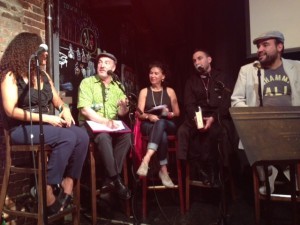 Jager’s translation reading as more melancholy, Charette’s as angrier and more colloquial (with more cursing, too). Diop seemed convinced by both approaches. And then he started talking about his own work as a self-translator (he writes sometimes in French, sometimes in Wolof – a language from which it’s much harder to get translated). After a disappointing experience of seeing an early work of his translated (“the translator was too respectful to the text,” he lamented), he decided to self-translate the next one, and wound up turning a 250-page Wolof original into 500 pages of French. He describes his modus operandi as “J’ai traduit sans traduire tout en traduisant.” He wound up expanding a lot and adding context because, as he explained, so many of the things he wrote about fairly compactly in Wolof required lengthier explanations to be comprehensible to readers of French outside his native Senegal. I’m guessing he enjoyed the chance to expand on certain themes as well. When asked whether he would approve of some other translator approaching his text in such a way, he responded with an enthusiastic “Yes!” I’m not sure every author would see it the same way, but it was refreshing to hear.
Jager’s translation reading as more melancholy, Charette’s as angrier and more colloquial (with more cursing, too). Diop seemed convinced by both approaches. And then he started talking about his own work as a self-translator (he writes sometimes in French, sometimes in Wolof – a language from which it’s much harder to get translated). After a disappointing experience of seeing an early work of his translated (“the translator was too respectful to the text,” he lamented), he decided to self-translate the next one, and wound up turning a 250-page Wolof original into 500 pages of French. He describes his modus operandi as “J’ai traduit sans traduire tout en traduisant.” He wound up expanding a lot and adding context because, as he explained, so many of the things he wrote about fairly compactly in Wolof required lengthier explanations to be comprehensible to readers of French outside his native Senegal. I’m guessing he enjoyed the chance to expand on certain themes as well. When asked whether he would approve of some other translator approaching his text in such a way, he responded with an enthusiastic “Yes!” I’m not sure every author would see it the same way, but it was refreshing to hear.
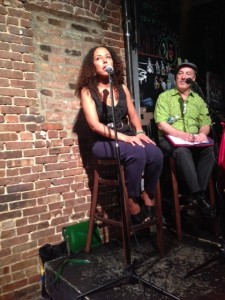 Mariposa’s poem “Ay please por favor … God Bless America” (which she half recited, half sang) was stunning in her performance, and her three translators (one of whom came dressed as a priest though he is not a priest) did really interesting things with it that I can’t do justice here because my Spanish skills are crummy. Zaidenwerg (who’s Argentine), translated “war-mongers” into “milicos,” which resonates with Argentina’s “dirty war” in the late 70s and early 80s. (The others used “sedientos de guerra” [Gasteazoro] and “mercaderes de guerra” [Noel]). There was also some discussion about how to translate the term “Native Americans” in the context of the poem: “aborigines”? “nativos de América”? “Nativos Americanos”? Mariposa also provided some background about the poem’s context: just before 9/11, she’d been in Durban, South Africa for an international conference on racism that included the discussion of reparations for the transatlantic slave trade. It was a tense moment in terms of the Palestinian/Israeli conflict, and the news media, she said, focused on that and downplayed the conference even though it was quite high profile. Colin Powell showed up for it, but then Bush made him leave. After she got home, 9/11 happened, the NY Post printed full-page flags that everyone hung in their windows, and her experience of being confronted with this intense, even enforced patriotism while still feeling like an “other” was what prompted the poem.
Mariposa’s poem “Ay please por favor … God Bless America” (which she half recited, half sang) was stunning in her performance, and her three translators (one of whom came dressed as a priest though he is not a priest) did really interesting things with it that I can’t do justice here because my Spanish skills are crummy. Zaidenwerg (who’s Argentine), translated “war-mongers” into “milicos,” which resonates with Argentina’s “dirty war” in the late 70s and early 80s. (The others used “sedientos de guerra” [Gasteazoro] and “mercaderes de guerra” [Noel]). There was also some discussion about how to translate the term “Native Americans” in the context of the poem: “aborigines”? “nativos de América”? “Nativos Americanos”? Mariposa also provided some background about the poem’s context: just before 9/11, she’d been in Durban, South Africa for an international conference on racism that included the discussion of reparations for the transatlantic slave trade. It was a tense moment in terms of the Palestinian/Israeli conflict, and the news media, she said, focused on that and downplayed the conference even though it was quite high profile. Colin Powell showed up for it, but then Bush made him leave. After she got home, 9/11 happened, the NY Post printed full-page flags that everyone hung in their windows, and her experience of being confronted with this intense, even enforced patriotism while still feeling like an “other” was what prompted the poem.
As for the translations, I had the impression that they were largely of a sort that would have made Boris Diop proud.
The post Talking Translation at the 2015 PEN World Voices Festival: Bloggers and the Slam appeared first on TRANSLATIONiSTA.
May 10, 2015
Talking Translation at the 2015 PEN World Voices Festival: Women’s Voices
Yesterday I sat on a panel entitled “Who We Talk About When We Talk About Translation: Women’s Voices” at the PEN World Voices Festival. The panel, sponsored by the PEN Translation Committee, was the brainchild of Co-Chair Margaret Carson, who had impressively crunched a lot of numbers borrowed from Three Percent’s amazing Translation Database that were transformed by VIDA graphmeister David Fitzgerald into a series of revealing tables showing gender distribution in the translated works published by a number of U.S. presses as well as those selected for translation prizes. The results came as a surprise to me: I hadn’t expected to see quite so enormous a disparity, including among some publishers dear to my heart. But that’s the usefulness of numbers: They force us to think concretely about issues we might otherwise have brushed aside. Here’s the graph showing the proportions between male and female writers in translation brought out in 2014 by the top two dozen U.S. houses for works in translation. 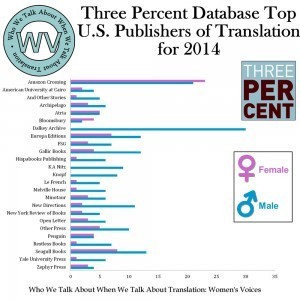 (N.B. we’re talking about the gender of the original author here, not that of the translator.) The worst offender was Dalkey Archive, which published 30 books last year, every last one of them by a male author. On the other end of the spectrum is Amazon Crossing, which published both the most translated books overall and the most translated books by women. I’m going to hazard a guess that the explanation for their woman-friendly stats is that they publish mostly genre fiction, an area in which women are published much more widely in many languages than in literary fiction. Which, yes, is problematic. (As is, by all accounts, the way Amazon has been going about finding translators for these genre fiction books [via an online bidding system] and contracting for their work [pay rumored to be very low, but details unavailable thanks to Amazon’s love of the non-disclosure agreement]).
(N.B. we’re talking about the gender of the original author here, not that of the translator.) The worst offender was Dalkey Archive, which published 30 books last year, every last one of them by a male author. On the other end of the spectrum is Amazon Crossing, which published both the most translated books overall and the most translated books by women. I’m going to hazard a guess that the explanation for their woman-friendly stats is that they publish mostly genre fiction, an area in which women are published much more widely in many languages than in literary fiction. Which, yes, is problematic. (As is, by all accounts, the way Amazon has been going about finding translators for these genre fiction books [via an online bidding system] and contracting for their work [pay rumored to be very low, but details unavailable thanks to Amazon’s love of the non-disclosure agreement]).
These issues have been in the air for several years, thanks to the pioneering work of VIDA (which you absolutely should investigate ASAP if you don’t already know it). Yesterday’s panelists included VIDA’s great number-cruncher, Jen Fitzgerald, in charge of producing the VIDA Count figures for the first five years of VIDA’s existence (i.e. until this year). Rob Spillman, who received one of the inaugural VIDO awards from VIDA for his work as the editor of Tin House, was on the panel as well, along with novelist Véronique Tadjo (currently of Witwatersrand, though she has roots in France and the Côte d’Ivoire). Magaret Carson co-moderated along with Alta Price and gave us quite the slide show.
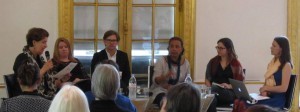
Photo credit Alex Zucker
Listening to Fitzgerald and Spillman talk about VIDA’s work and its effects was inspiring. Some publishers have responded defensively to the VIDA Count (e.g. see TLS editor Peter Stothard saying he’s pleased to be moving towards a “closer balance” in his journal even though less than one third of his reviewers last year were women). Spillman’s response when the first VIDA count was published in 2010 was to start reviewing Tin House’s internal statistics, and what he found was that while the TH staff thought they were publishing roughly equal numbers of men and women, they weren’t. But a year later TH was achieving parity (and has ever since), largely through revised strategies for soliciting work. Spillman says that while he had always solicited work from equal numbers of men and women, the men were twice as likely to respond by sending him work. And women who were rejected with a generic note inviting them to resubmit were one quarter as likely to do so as their male peers. Being rejected seemed to have a different effect on the women. So Spillman began putting more effort into making his rejection notes more explicitly encouraging and following up with requests for additional submissions. By pursuing authors more persistently, he soon found more work by female authors that he wanted to print.
And what about the translation world? When it comes to the authors having their work translated and winning translation prizes in the U.S., Carson’s figures show a strong gender bias overall. And while male and female translators are getting their translations published in similar numbers, the major U.S. translation prizes (National Translation Award, PEN Translation Prize, PEN Award for Poetry in Translation, Best Translated Book Award) have been going overwhelmingly to male translators. I wonder whether the female translators winning the major awards are more likely to win them for translations of male authors; this would require even more number-crunching to determine.
In any case, it appears that female authors are likely to have female translators. Véronique Tadjo weighed in on this question, noting that every time a work of hers has been translated into English (9 books to date, including 4 YA titles), it’s been because a translator has championed her work – and all of these have been women. This was apparently the case even for The Shadow of Imana, Travels in the Heart of Rwanda (Oxford: Heinemann, 2002) – an important work researched in Rwanda after the genocide. Tadjo pointed out how difficult it is for a francophone writer to get noticed internationally – her language and nationality puts her in the minority both among African writers and among writers of French. It’s also a significant problem in Africa that there is so little translation happening between the many African languages – the reliance on colonial languages for communication among peoples is obviously problematic. Many writers turn to French or English for their literary work in the hope of reaching a wider audience – and does this mean they are catering to a Western readership? Most of the authors she knows who still write indigenous languages are women.
In my own contribution to the panel, I spoke about the need for a prize to recognize translated work by women. This is something I’ve been talking about on this blog for months now, following the lead of Katy Derbyshire, who’s been writing about this for the past year (and just spoke on the issue at the London Book Fair). Katy’s prize in the U.K. is still in the works, and I think we should get one in the works in the U.S. too. So what sort of prize should it be, and should it be independent or administered by another entity? If it’s a prize for a translated book by a woman (a prize for the author with no thought to the translator), we translators might approach VIDA and ask if they would consider adding a prize for a translated work by a woman to their array of prizes (new this year!). If it’s a prize for both the book and the translator, it might be administered by ALTA. Or it might be independent, administered by a to-be-formed coalition of women and allies. At some point, too, the definitions of such a prize should take the inadequacies of the gender binary into consideration as well
Rob Spillman suggested that Tin House might create an award for a translation-in-progress of a work by a female author – the prize would consist of publication by Tin House Press with a proper contract and advance. I think that’s a splendid idea and offered my help getting such a competition off the ground. Michael Reynolds of Europa Editions suggested from the audience the creation of an acquisition grant for publishers to encourage them to print books by women. I think that would be terrific too, but if I’m going to fundraise for something, I want the $ to go directly into the hands of translators. Europa already comes in around the middle of the pack in terms of gender parity, with 37% translated female authors last year, assuming the person writing under the pseudonym “Elena Ferrante” is actually a woman. (Does anyone know?)
Meanwhile literature in translation would appear to be flourishing in this country – Katrine Jensen, who’s serving as a Best Translated Book Award juror, reported that there were 500 submissions in the Fiction category this year. That’s a nice juicy batch of translations.
Oh, and a pro tip from Jen Fitzgerald: posting on social media is a great way to bring attention to issues like this, and she encourages use of hashtags like #TranslateWomen or @Biblibio‘s #womenintranslation in posts relating to the topic. Sounds good to me.
I attended two other splendid translation events at PEN World Voices this week as well (the Translation Slam and the panel on blogging about translated literature), but this post is already too long, so I’ll have to report on them later. Meanwhile, keep an eye on Words without Borders, which sent bloggers to all the translation-related PWV events this year (with reports still coming in as of this writing).
The post Talking Translation at the 2015 PEN World Voices Festival: Women’s Voices appeared first on TRANSLATIONiSTA.
May 8, 2015
2015 Helen and Kurt Wolff Prize to Catherine Schelbert
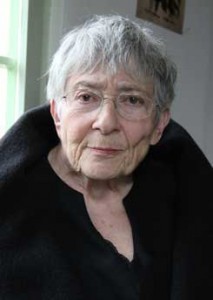 It’s raining translation prizes this morning. The Helen and Kurt Wolff Translator’s Prize (named for the legendary publishing couple) has just been awarded to Catherine Schelbert for her translation of Hugo Ball’s Flametti: oder vom Dandysmus der Armen (Flametti, or The Dandyism of the Poor) published by Wakefield Press in 2014. This $10,000 prize is the highest honor bestowed up on translator from German. The award will be presented to Schelbert next month by the Consul General of Germany in New York.
It’s raining translation prizes this morning. The Helen and Kurt Wolff Translator’s Prize (named for the legendary publishing couple) has just been awarded to Catherine Schelbert for her translation of Hugo Ball’s Flametti: oder vom Dandysmus der Armen (Flametti, or The Dandyism of the Poor) published by Wakefield Press in 2014. This $10,000 prize is the highest honor bestowed up on translator from German. The award will be presented to Schelbert next month by the Consul General of Germany in New York.
The jury noted:
On every page, Catherine Schelbert has rendered Ball’s slangy, offbeat German into equally exuberant English. Her translation was far and away our first choice and makes this Dada classic at long last available to an English-speaking readership.
I’m also glad to see a book by Hugo Ball receive the attention that will come with the prize. The under-sung inventor of the Dada movement who regularly slapped the faces of the Zurich bourgeoisie with his revolutionary sound poems from the stage of the Cabaret Voltaire (long defunct, alas) definitely deserves to be better known.
Congratulations to Schelbert for this honor! More information about her and the prize here.
The post 2015 Helen and Kurt Wolff Prize to Catherine Schelbert appeared first on TRANSLATIONiSTA.
2015 Ralph Manheim Medal to Burton Watson
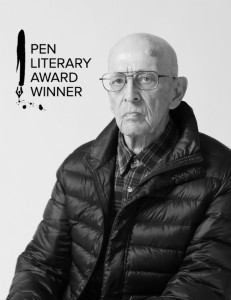 The Ralph Manheim Medal awarded by the Translation Committee of the PEN American Center is a lifetime achievement award for a distinguished translator and is given every three years. Previous winners include such luminaries as Gregory Rabassa, Edith Grossman, and Richard Howard. The award was initiated by funds donated by Bernard Malamud and Gay Talese, and has received additional support from the family and friends of Ralph Manheim, who died in 1992.
The Ralph Manheim Medal awarded by the Translation Committee of the PEN American Center is a lifetime achievement award for a distinguished translator and is given every three years. Previous winners include such luminaries as Gregory Rabassa, Edith Grossman, and Richard Howard. The award was initiated by funds donated by Bernard Malamud and Gay Talese, and has received additional support from the family and friends of Ralph Manheim, who died in 1992.
The 2015 Medal has been awarded to Burton Watson, known for his translations of classical East Asian poetry, including (among many others) the work of Chuang Tzu, Han-shan, Su Tung-P’o, and Po Chü-i. His translations include poetry, prose, histories and sacred texts written originally in classical Chinese and Japanese. More information about the prize and remarks on Watson .
The Ralph Manheim Medal will be formally presented in a ceremony at the New School on June 8, together with the PEN Translation Prize and PEN Award in Poetry in Translation (winners to be announced May 13).
The post 2015 Ralph Manheim Medal to Burton Watson appeared first on TRANSLATIONiSTA.
May 7, 2015
2015 Gutekunst Prize to Sophie Duvernoy
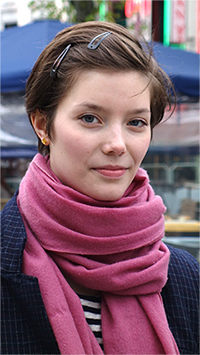 The winner of the 2015 Gutekunst Prize for Young Translators has just been announced: Sophie Duvernoy, whose translation of an excerpt from Eisenkinder by Sabine Rennefanz was chosen over those of the more than 40 other translators who applied this year. (Gutekunst applicants all translate the same text, making the submissions easier to compare than is the case with prizes in which each translator works on a different text.) Honorable mention went to Jillian DeMair. The Gutekunst Prize is an annual competition for translators from German under 35 who have not yet published or been placed under contract for a book-length work. The competition, now in its fifth year, has seen ever larger numbers of applicants, making it ever more difficult to judge. This year’s jury consisted of Shelley Frisch, Tess Lewis, and Michael Reynolds. Not sure which of them wrote the jurors’ statement this year, but I liked what they had to say about the judging process:
The winner of the 2015 Gutekunst Prize for Young Translators has just been announced: Sophie Duvernoy, whose translation of an excerpt from Eisenkinder by Sabine Rennefanz was chosen over those of the more than 40 other translators who applied this year. (Gutekunst applicants all translate the same text, making the submissions easier to compare than is the case with prizes in which each translator works on a different text.) Honorable mention went to Jillian DeMair. The Gutekunst Prize is an annual competition for translators from German under 35 who have not yet published or been placed under contract for a book-length work. The competition, now in its fifth year, has seen ever larger numbers of applicants, making it ever more difficult to judge. This year’s jury consisted of Shelley Frisch, Tess Lewis, and Michael Reynolds. Not sure which of them wrote the jurors’ statement this year, but I liked what they had to say about the judging process:
Judging a translation prize for young translators is doubly difficult because jurors not only have to evaluate how successfully a work has been translated, how well it balances faithfulness to the source language and fluency in its target language, how expertly a translator solves the dilemmas and avoids the traps that lurk in every text, they must also evaluate the potential for future greatness that a young translator demonstrates in her translation. It’s a bit like looking at saplings to decide which will make the best banquet table 20 years from now.
Congratulations to Sophie Duvernoy for this recognition of her work! You’ll find more information about her and about the prize itself on the Goethe Institut website.
The post 2015 Gutekunst Prize to Sophie Duvernoy appeared first on TRANSLATIONiSTA.
May 5, 2015
Best Translated Book Award 2015 Shortlists
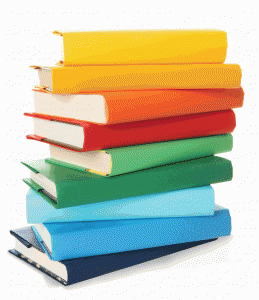 A month ago, the 2015 Best Translated Book Award longlists came out – you might still be reading them, they’re the longest longlists of all time (though perhaps not so long if you consider that close to 600 titles were submitted). But if you’re not done yet, you might now want to skip to the shortlists, which were announced earlier today. Feast your eyes on this:
A month ago, the 2015 Best Translated Book Award longlists came out – you might still be reading them, they’re the longest longlists of all time (though perhaps not so long if you consider that close to 600 titles were submitted). But if you’re not done yet, you might now want to skip to the shortlists, which were announced earlier today. Feast your eyes on this:
2015 Best Translated Book Award Fiction Finalists
The Last Lover by Can Xue, translated from the Chinese by Annelise Finegan Wasmoen (China, Yale University Press)
The Author and Me by Éric Chevillard, translated from the French by Jordan Stump (France, Dalkey Archive Press)
Fantomas Versus the Multinational Vampires by Julio Cortázar, translated from the Spanish by David Kurnick (Argentina, Semiotext(e))
Pushkin Hills by Sergei Dovlatov, translated from the Russian by Katherine Dovlatov (Russia, Counterpoint Press)
Those Who Leave and Those Who Stay by Elena Ferrante, translated from the Italian by Ann Goldstein (Italy, Europa Editions)
Things Look Different in the Light by Medardo Fraile, translated from the Spanish by Margaret Jull Costa (Spain, Pushkin Press)
Harlequin’s Millions by Bohumil Hrabal, translated from the Czech by Stacey Knecht (Czech Republic, Archipelago Books)
The Woman Who Borrowed Memories by Tove Jansson, translated from the Swedish by Thomas Teal and Silvester Mazzarella (Finland, NYRB)
Faces in the Crowd by Valeria Luiselli, translated from the Spanish by Christina MacSweeney (Mexico, Coffee House Press)
La Grande by Juan José Saer, translated from the Spanish by Steve Dolph (Argentina, Open Letter Books)
2015 Best Translated Book Award Poetry Finalists
Diorama by Rocío Cerón, translated from the Spanish by Anna Rosenwong (Mexico, Phoeneme)
Lazy Suzie by Suzanne Doppelt, translated from the French by Cole Swenson (France, Litmus Press)
Where Are the Trees Going? by Venus Khoury-Ghata, translated from the French by Marilyn Hacker (Lebanon, Curbstone)
Diana’s Tree by Alejandra Pizarnik, translated from the Spanish by Yvette Siegert (Argentina, Ugly Duckling)
Compleat Catalogue of Comedic Novelties by Lev Rubinstein, translated from the Russian by Philip Metres and Tatiana Tulchinsky (Russia, Ugly Duckling)
End of the City Map by Farhad Showghi, translated from the German by Rosmarie Waldrop (Germany, Burning Deck)
The winners will be announced at a panel featuring several BTBA judges at a panel at BookExpo America, at 2:30 p.m. on Wednesday, May 27 (Eastside Stage). There’ll be a party to celebrate the winning books at 5:00 p.m. the same evening at The Folly (92 W. Houston St.). More information here. Congratulations to all the finalists!
The post Best Translated Book Award 2015 Shortlists appeared first on TRANSLATIONiSTA.
Susan Bernofsky's Blog
- Susan Bernofsky's profile
- 62 followers



